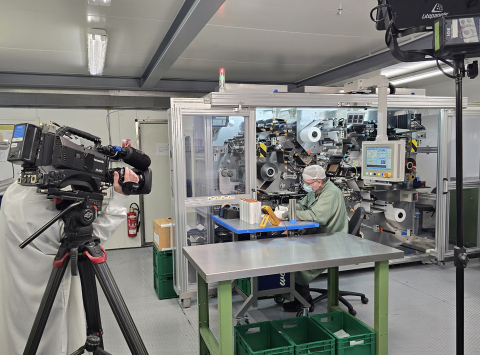In mid-April, a tv team dropped by the EAS site in Nordhausen to talk to the managers of the German hub for international cell and battery development about the future of the European battery landscape. The occasion for the public service research for radio and television is a study focusing on the opportunities and risks for German companies associated with the expansion of e-mobility. The journalists were particularly interested in the dependence of German companies on Asian suppliers.
Theoretically, a standalone European market for lithium-ion cells and batteries is possible. "EAS's vertical integration covers the entire chain from the powder of the active material to the finished battery system," says EAS Head of Sales Dr Frank Diehl. "We mainly use German or European products and services." However, the cost structure becomes a challenge as soon as the scale exceeds development projects, prototype production and small series. It would therefore be necessary to install a reliable active materials economy in Germany and Europe that imports and processes raw materials in sufficient quantities: "We would have to develop the entire value chain of battery and cell production on our continent in order to ramp up the capacities for independent cell production to the size of gigafactories," says EAS Managing Director Michael Deutmeyer. "Successful scaling includes the complete infrastructure around cell production, which ensures that the materials are supplied in good quality within Europe. We could achieve comparable - or at least realisable - prices through volume. The demand would allow it."
A complete battery economy in Europe also includes the corresponding recycling economy. "If we want to disentangle ourselves from Asian suppliers, we need to draw the right conclusions," says Dr Frank Diehl. "The European countries must not only expand their production capacities, but also organise take-backs on the same scale and ensure the efficient use of their raw materials. To ensure their reutilisation, the corresponding circular economy must also be established. At battery level, the concept of the three Rs 'reduce, reuse, recycle' can be extremely helpful here - in addition to the sustainable effect of saving energy."

Technologically, Europe is well positioned. "The transfer of our EAS technologies to Gigafactories is already working," says Dr Frank Diehl. "Europe is currently keeping up in the development of new or improved cell and production technologies." However, in addition to the technological possibility of an independent battery industry in Europe, there is also the question of a common approach. "Ultimately, it's a political decision," says Michael Deutmeyer. "Such a strategy must be supported by regulations and subsidised with financial resources. By cutting funding for battery technology research, the German government has not exactly acted with the future in mind. We need the next generation of scientists and engineers just as much as we need the recycling quota - both in the strategic orientation towards an independent electro-mobile Europe and in securing the corresponding investments."
It still remains to be shown to what extent these insights and assessments will actually be included in the MDR programme. The TV broadcast is planned for 28 April on MDR Thüringen Journal. "There might also be a radio version," says Dr Frank Diehl. "We are already very excited and look forward to the journalistic treatment of these important topics."